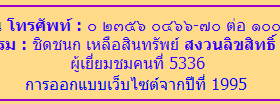There's some good discussion going on in the comments of yesterday's post about the new version of the online Royal Institute Dictionary, version 0.9.
There's another new thing I haven't commented on yet: the visitor counter. It sits there at the bottom of the page and tells you are ผู้เยี่ยมชม (visitor) number whatever. It debuted late the night of the 7th. The afternoon of the 8th it was around 1700. Right now, not quite two days after its debut, it's at 5336.
Of course, it's not counting visitor's at all. It's counting page views, and only of the main page, a very unsophisticated way of measuring traffic. It's a very 1990s-era counter, but at least it's not a cheesy odometer graphic. I'm responsible for a few dozen of those hits, and just now I refreshed about 10 times just to watch the number go up.
I hope they're keeping better track on their end of things. I want to tell them about free and excellent tools like Google Analytics. But then maybe traffic stats are considered "official information" unsuitable to trust foreigners with.
All said, they're getting thousands of page views per day. That's more than I can claim...

Yeah that site is very Web 0.2.
ReplyDeleteDo you have any idea why it is so poor though? I work in IT in Thailand and I see plenty of government projects that make plenty of advanced use of technology. So it's weird to see something prestigious like the Royal Institute do such a bad job.
I spoke with Doug Cooper about this a little at the recent BarCamp, but I didn't get anything definitive.
I don't really get it, either. Most of the RID's work is only inching into the computer era. I think it's mostly a matter of being a particularly slow-moving organization whose senior members tend to stick around past retirement age, and so they're caught in a vortex between epochs right now.
ReplyDeleteCan you give specific examples of government projects that use advanced tech, or the type of advanced tech they use? I guess you can point to NECTEC as the epicenter of it, which is a pretty huge operation I understand. Were you thinking of something else?
I've worked with NECTEC, SIPA, two universities, and the Customs Department. I also know that Sun Microsystems has a dedicated account manager for government projects, indicating that government is a significant source of sales. I'm sure IBM, HP, and Microsoft are the same.
ReplyDeleteOh, I just remembered that a colleague of mine has done interesting projects with the Royal Thai Police and the Revenue Department.
Most of the work I've done is infrastructure: servers, routers, firewalls, as well as security applications and auditing. So it's pretty similar to this online dictionary. However the SIPA project was software development. We were building an open source Linux distribution for Thai SMEs. Unfortunately, it lost funding before completion, but the project was quite inspiring.
Jason/Rikker, do you know what the relationship is between NECTEC and the RID, or if there's a collaboration between them ? A lot of the Thai words in Nectec's Lexitron have definitions that seem to have been taken directly from the RID, yet the RID is สงวนลิขสิทธิ์ as in Rikker's photo while Lexitron is freely available. I can't quite work out what's going on there.
ReplyDeleteMike, that's a good point but I have no idea myself. I've never been involved in either project.
ReplyDeleteAs I understand it, NECTEC has some limited relationship with RID, but not in any consistent way. They worked with the RI in 1996 to produce the (limited edition) CD-ROM version of RID82 that then became the basis for the first internet version of RID.
ReplyDeleteFor this recent new RID online, they contracted out the programming work (from scratch), but not with NECTEC this time.
I'm not sure what that means about any relationship between the content of their two dictionaries. I don't use Lexitron that much, but I've never noticed a correspondence between them. Can you post examples of definitions you think correspond?
I would think if there is a correspondence, it means they have some sort of understanding, because the RI is conscientious about their copyright. They've taken issue with blatant copiers in the past.
There was a dictionary called พจนานุกรม ฉบับเฉลิมพระเกียรติ released in 1987 that copied both the style and content of RID, to the point that most people assumed it was produced by the Royal Institute as a special edition for the King's 60th birthday. It went to the Supreme Court and RI won. It's an interesting case that I think I'll write a post about.
Thanks for the answers :)
ReplyDeleteRikker, how about these three for example ?
RID: เงินต้น น. เงินที่ให้กู้ยืมโดยไม่รวมดอกเบี้ย, ต้นเงิน ก็ว่า.
Lex: ต้นเงิน [N] principal ; capital
Syn. เงินต้น, ต้น
Def. เงินที่ให้กู้ยืมโดยไม่รวมดอกเบี้ย ต้นเงิน ก็ว่า
Sample. ยอดต้นเงินที่เขาปล่อยกู้กินดอกเป็นจำนวนหลายแสนบาท
----------------------
RID: เครื่องล่าง น. อุปกรณ์ประกอบที่อยู่ใต้พื้นรถยนต์ เช่น สลัก ลูกหมาก คันส่ง
แหนบ ล้อ คานปีกนก, เครื่องช่วงล่าง ก็ว่า.
Lex: เครื่องล่าง [ N ] lower part of car supporters
[ Def ] อุปกรณ์ประกอบที่อยู่ใต้พื้นรถยนต์ เช่น สลัก ลูกหมาก คันส่ง แหนบ ล้อ คานปีกนก, เครื่องช่วงล่าง ก็ว่า
----------------------
RID: อาญาสิทธิ์ น. อํานาจเด็ดขาด คือ สิทธิที่แม่ทัพได้รับพระราชทานจาก
พระเจ้าแผ่นดินในเวลาไปสงครามเป็นต้น, อาชญาสิทธิ์ ก็ว่า,
โดยมีสิ่งสําคัญคือพระแสงดาบเป็นเครื่องหมาย เรียกว่า
พระแสงอาญาสิทธิ์ หรือ พระแสงอาชญาสิทธิ์.
Lex: อาญาสิทธิ์ [N] absolute power
Syn. อาชญาสิทธิ์
Def. อำนาจเด็ดขาด คือ สิทธิที่แม่ทัพได้รับพระราชทานจากพระเจ้าแผ่นดินในเวลาไปสงครามเป็นต้น, อาชญาสิทธิ์ ก็ว่า, โดยมีสิ่งสำคัญคือพระแสงดาบเป็นเครื่องหมาย ซึ่งเรียกว่า พระแสงอาญาสิทธิ์ หรือ พระแสงอาชญาสิทธิ์
Sample. ทุกกลุ่ม ทุกองค์กรของสังคมมอบอาญาสิทธิ์ให้รัฐกู้วิกฤติเศรษฐกิจที่เกิดขึ้นตามวิธีการที่รัฐเห็นว่าถูกต้อง
Well, that's clear enough, isn't it?
ReplyDeleteI don't know, but I assume they have permission. Lexitron is done for academic/teaching purposes, not for profit, so it seems like the type of think the RI would allow.